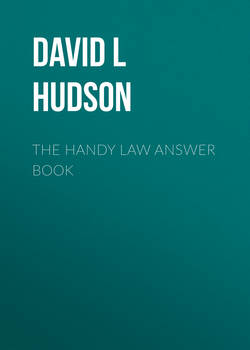Читать книгу The Handy Law Answer Book - David L Hudson - Страница 141
На сайте Литреса книга снята с продажи.
What does assistance of counsel mean?
ОглавлениеThis last freedom mentioned in the Sixth Amendment ensures that those defendants facing prison time have a lawyer to assist them in their defense. The U.S. Supreme Court in Gideon v. Wainwright (1963) recognized that attorneys in criminal cases are “necessities, not luxuries.”
LegalSpeak: Crawford v. Washington (2004)
First, the principal evil at which the Confrontation Clause was directed was the civil-law mode of criminal procedure, and particularly its use of ex parte examinations as evidence against the accused. It was these practices that the Crown deployed in notorious treason cases like Raleigh’s; that the Marian statutes invited; that English law’s assertion of a right to confrontation was meant to prohibit; and that the founding-era rhetoric decried. The Sixth Amendment must be interpreted with this focus in mind.
Accordingly, we once again reject the view that the Confrontation Clause applies of its own force only to in-court testimony, and that its application to out-of-court statements introduced at trial depends upon the law of Evidence for the time being.
The Court explained:
Lawyers to prosecute are everywhere deemed essential to protect the public’s interest in an orderly society. Similarly, there are few defendants charged with crime, few indeed, who fail to hire the best lawyers they can [542 U.S. 418] get to prepare and present their defenses. That government hires lawyers to prosecute and defendants who have the money hire lawyers to defend are the strongest indications of the widespread belief that lawyers in criminal courts are necessities, not luxuries. The right of one charged with crime to counsel may not be deemed fundamental and essential to fair trials in some countries, but it is in ours. From the very beginning, our state and national constitutions and laws have laid great emphasis on procedural and substantive safeguards designed to assure fair trials before impartial tribunals in which every defendant stands equal before the law. This noble ideal cannot be realized if the poor man charged with crime has to face his accusers without a lawyer to assist him.
